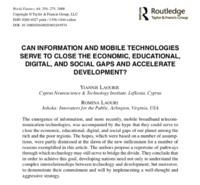Harnessing the collective wisdom of diverse stakeholders towards identifying obstacles that R&I organizations face in their effort to develop and implement Gender Equality Plans: Difference between revisions
(Created page with "{{Journal Publication |acronym=Harnessing the collective wisdom of diverse stakeholders towards identifying obstacles that R&...") |
No edit summary |
||
| Line 11: | Line 11: | ||
==Abstract== | ==Abstract== | ||
In this paper, we present and compare results from three participatory structured democratic dialogue processes. The dialogues were designed to capture the responses of stakeholders across Europe to three very similar triggering questions: (1) What existing practices can be identified to facilitate the development and implementation of GEPs in academia and research organisations? (2) What measures/actions (administrative, organizational culture-related, financial, legal...) should be taken to make Gender Equality Plan implementation beneficial for all employees in research organizations? And (3) What are the best practices to overcome problems, barriers, and issues when implementing your GEPs? Each process has produced a different number of responses, but their content is, to some extent, similar. Similarities and differences are compared and critiqued with a view toward revealing differences but also homogeneities across Europe. | |||
[[Category:Journal Publication]] | [[Category:Journal Publication]] | ||
Revision as of 06:35, 20 August 2022
|
Abstract
In this paper, we present and compare results from three participatory structured democratic dialogue processes. The dialogues were designed to capture the responses of stakeholders across Europe to three very similar triggering questions: (1) What existing practices can be identified to facilitate the development and implementation of GEPs in academia and research organisations? (2) What measures/actions (administrative, organizational culture-related, financial, legal...) should be taken to make Gender Equality Plan implementation beneficial for all employees in research organizations? And (3) What are the best practices to overcome problems, barriers, and issues when implementing your GEPs? Each process has produced a different number of responses, but their content is, to some extent, similar. Similarities and differences are compared and critiqued with a view toward revealing differences but also homogeneities across Europe.
